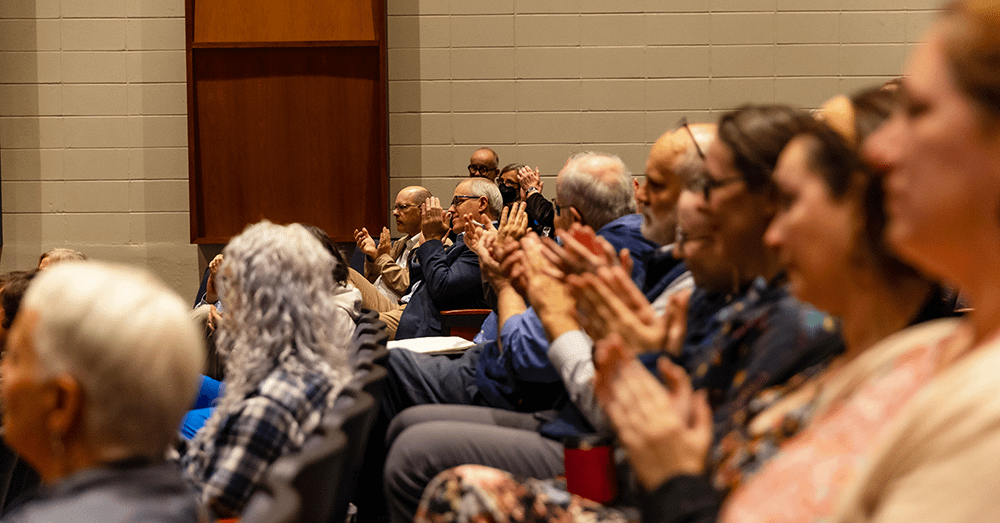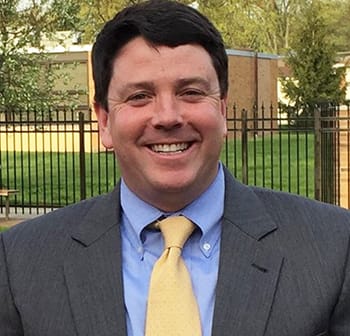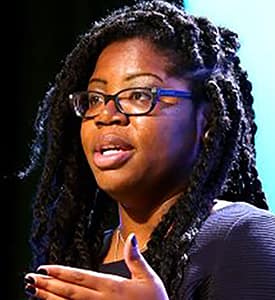Nearly 120 hear author Carr’s virtual Sutherland talk
His timely topic for annual lecture was “Living Virtually: How Digital Media Shapes our Thoughts and Perceptions”
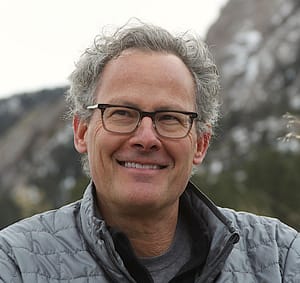
Nick Carr
This year’s 2020 Sutherland Lecture, presented Thursday afternoon, October 22, by author Nicholas Carr to a virtual audience of about 120 people via Zoom because of the pandemic, was titled “Living Virtually: How Digital Media Shapes Our Thoughts and Perceptions.”
In his presentation, which began online at 4:30 p.m., the bestselling author talked about how computers, smartphones and social media have reshaped the way we live – a trend accelerated by the social distancing required during the current pandemic.
Carr started out by saying that, thanks to technologies like the Internet and Zoom, people all over the world have able to continue with many daily tasks since the pandemic began. Therefore, all of those technologies – including our smartphones – do have some very valuable benefits.
However, Carr also provided details regarding many studies concerned with how our use of these smartphones have impacted how we interact with others, as well as how we complete the tasks we are responsible for each day.
Of the six basic cognitive traits, he said, our ability to distinguish the most important facts from a large collection we are looking at is lessened significantly even if our phone is only close by and not on. These studies have shown that our smartphones now demand our attention, even when they are not on – but it is the distractions that our smartphone does generate that has taken a toll on our cognitive abilities. If our phones are anywhere near us, they demand our attention indirectly since most smartphone users want to check them, and this is impacting what Carr calls our fluid intelligence — the ability to make sense of new problems or situations we have not experienced before. We don’t have long stretches without being interrupted by emails, notifications, or the like, he said, and we are losing valuable time for contemplation, reflection and the creativity/imagination that comes with longer periods of time without these distractions.
Carr also says that our smartphones have achieved supernormal salience because most of us are always thinking about, or suppressing our desire to use our smartphones, as they are (sadly) never not part of what our mind is thinking about.
The speaker said that while we are adapting to using our smartphones, however, we are sacrificing much – by giving it this power over us. The number of teenagers who would rather interact over text or social media and other technology has increased from 50 percent in 2012 to 67 percent in 2018, and that percentage is probably even higher today. Carr mentioned that we are essentially losing control over our mind, and what we decide to pay attention to, because of all of these new technologies, but the fact that you can carry this powerful device in your pocket/hand, makes it even a much more prevalent factor in our daily lives than the desktop/laptop computer ever could be.
Good “attendance”
The fact that this year’s virtual audience could be notably larger than a more typical live audience of recent years for Sutherland lectures testified to the power of such technology as Carr was discussing and has written about extensively in his books and articles.
A follow-up Zoom with about 10 Saint Michael’s faculty to chat with Carr after his talk indicated that Thursday’s audience found the lecture to be most timely and provocative. Carr in his work draws on recent scientific research to examine the cognitive, psychological and social costs and benefits of our ever-expanding dependency on digital technology. The lecture ran about an hour, with a short question and answer session, wrapping up shortly before 6 p.m.
As an unexpected honor and surprise for the lecture organizers from the Saint Michael’s Dean’s Office and Academic Affairs — one which might not have been feasible for an in-person lecture — among those in “virtual” attendance was Denise Sutherland, widow of the late Don Sutherland, after whom the Lecture Series is named. Don Sutherland, a distinguished and successful businessman and Princeton University graduate, was a major supporter of Saint Michael’s as a former trustee. He died in 2002, and the Lecture Series that bears his name was established in 2003 with a significant guest speaker brought in annually since thanks to his major gift.
Denise Sutherland reached out to the Academic Affairs office to express her appreciation that the lecture could continue this year despite the pandemic, writing prior to her virtual participation in the audience, “I’m delighted to know that even during this Covid-challenged time, you are still able to present the Sutherland lecture. The selection of Nick Carr as speaker and his topic of Living Virtually couldn’t be more timely!”
Introductions from dean, professor
Introducing this year’s event at the start of the Zoom session was Tara Natarajan, dean of the college. Here are her remarks:
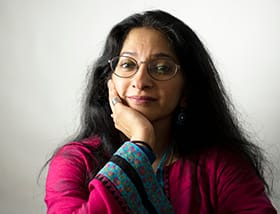
Dean Tara Natarajan
“I am thrilled to welcome you all, Students, Staff, Faculty and Administrators to the annual Sutherland lecture at Saint Michael’s College. My name is Tara Natarajan. I am Dean of the faculty and Professor of Economics. Mr. Donald J. Sutherland’s generous gift to the college helped establish a fund that supports an annual lecture in the liberal arts. The endowment gives the Dean the honor of administering this lecture series and she solicits proposals from faculty. Thanks to the introduction provided to me by Professor Adrie Kusserow, chair department of SO/AN, we have with us today Mr. Nicholas Carr, acclaimed Pulitzer Prize nominated author and writer. This lecture was originally scheduled to take place in April 2020 and with the College going remote in late spring, we postponed the lecture for the fall.
This year we are thrilled to have Mrs. Denise Sutherland with us today. Mrs. Sutherland, we are immensely grateful for the generous gift that has made this annual lecture possible. I’d also like to recognize Dr. Jeffrey Trumbower, the Vice President for Academic Affairs, who hosted several of the Sutherland lectures during his many years as Dean of the College.
Professor Kusserow will introduce our speaker momentarily, followed by Mr. Carr’s lecture. There will be an opportunity for a brief Q & A following the lecture. I request that attendees post questions into the chat after the lecture and not during the talk please. I will moderate the Q & A by reading the questions in the chat or invite the writer to read their own question if it seems more appropriate to do that.”
Kusserow says she first met Carr at Williams College when the two gave a presentation to anthropology students, during which Carr shared ideas on how the internet is influencing our brains, while Kusserow read ethnographic poems she had written on themes of the influence of digital technology on empathy and emotions.

Adrie Kusserow
For Thursday’s Zoom intro of the Sutherland Lecture, she offered some context and biographical background about Carr: “Nick Carr is a compelling writer and speaker whose work focuses on the intersection of technology, business, and culture. A former executive editor of the Harvard Business Review, he has written a series of bestselling books that have reshaped our understanding of and relationship with technology, including Does IT Matter?, The Glass Cage, and the Pulitzer Prize finalist The Shallows. Nick’s 2008 book The Big Switch: Rewiring the World, from Edison to Google has been praised as the best book on the rise of cloud computing. In addition to his books, Nick has written for The Atlantic, the Wall Street Journal, the New York Times, Wired, Nature, and MIT Technology Review, among others. In 2015, he received the Neil Postman Award for Career Achievement in Public Intellectual Activity from the Media Ecology Association. Nick is a former member of the Encyclopedia Britannica’s editorial board of advisors, was on the steering board of the World Economic Forum’s cloud computing project, and was a writer-in-residence at the University of California at Berkeley’s journalism school. He also maintains the popular blog.”
Professor John Trono of the St. Mike’s computer science faculty said he and his students this year read a New Yorker excerpt upon which Carr’s popular 2010 book “The Shallows” was based upon, so the talk particularly resonated with him and those students.


